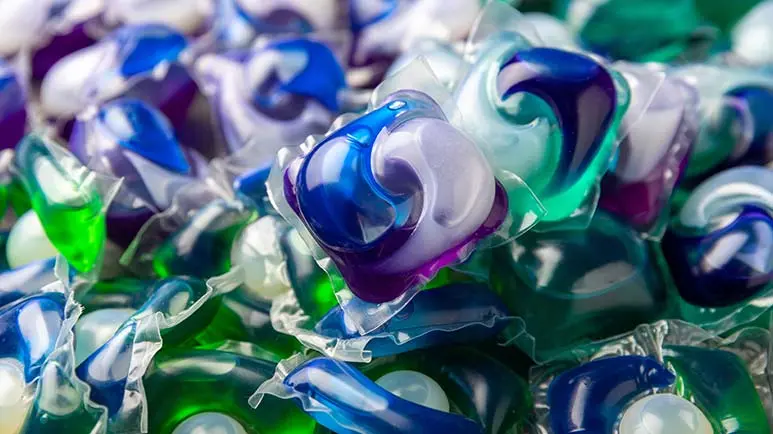Caution: Chewing on This Popular Product Could Be Deadly
Found in many homes, this product is designed to dissolve in water. If you accidentally drop one and your pet finds it and starts gnawing on it, you're headed towards trouble. Your pet's saliva can weaken the plastic and cause the poisonous contents to leak.

STORY AT-A-GLANCE
- When it comes to toxic household products, many pet parents don’t think to include laundry detergent on the list. With the introduction in recent years of laundry and dishwasher detergent pods, the risk of poisoned pets is even greater
- Detergent pods are more dangerous than bottled detergent for several reasons, including the concentrated formula and the fact that the contents are under pressure. The pods also tend to be more accessible to pets, and more attractive thanks to their packaging and nice smell
- The biggest risk of detergent pods to pets is the potential for aspiration of the liquid into the lungs. In severe cases, the detergent coats the airways and hampers oxygen exchange in the lungs, which can cause suffocation
- There is no antidote for detergent poisoning, so treatment is supportive. If you suspect your pet has been exposed to a laundry or dishwasher detergent pod, seek help immediately. Signs of significant exposure include vomiting or difficulty breathing
Editor's Note: This article is a reprint. It was originally published April 08, 2015.
An item that doesn't often show up on lists of household products toxic to pets is laundry detergent. But it should, because most detergents and soaps contain ionic and anionic surfactants. When ingested in small amounts, these chemicals can cause GI upset in a pet, such as excessive drooling, vomiting or diarrhea. Fortunately, it's unlikely most pets would have the opportunity or desire to ingest a large amount of bottled detergent.
But a new concern these days are those little brightly colored laundry detergent pods that smell good and look like candy or some other type of yummy treat to a small child or a pet. It's conceivable that a pet might eat enough pods to cause an obstruction in the GI tract, but the greater danger of laundry and also dish detergent pods is actually the potential for an animal, typically a dog, to bite into them and inhale the detergent.
According to ASPCA Animal Poison Control, dogs make up over 90% of detergent pod poisonings. Cats account for just 6.5%.1
Why Detergent Pods Are So Dangerous
The reason pods are more dangerous for pets than simply licking a bit of spilled detergent off the floor or their fur is the product formulation. The detergent in the pods is both highly concentrated and under pressure. If a pet bites down on the pod, it can cause the liquid to be forcefully expelled and easily aspirated (breathed in) or swallowed, often in large amounts. So even if you are using natural detergents in pods, there are still substantial risks.
Detergent is foamy, and when an animal ingests the stuff and then vomits, the foam can be pulled into the lungs. In a worst-case scenario, the detergent coats the airways and hampers oxygen exchange in the lungs, which causes suffocation.
Of the cases reported to the Pet Poison Helpline during 2013 and 2014, 72% of pets exposed to detergent pods developed symptoms of toxicity. Eighty-four percent had vomiting, 21% experienced coughing, 17% became lethargic, and 13% developed shortness of breath, wheezing, or other irritation of the respiratory tract.
Another problem with pods is they're often more accessible to a curious pet than bottled detergent due to their convenient packaging. A pod can easily wind up on the floor where a pet can find it and gnaw on it.
The pods are designed to dissolve in water, so saliva from a dog's mouth can weaken the plastic and cause the contents to leak out even if the pet hasn't actually punctured the package.
Treating Detergent Poisoning
There is no antidote for poisoning caused by exposure to laundry or dishwasher detergent. The focus of treatment is to dilute the exposed area, typically the mouth, skin or eyes, as much as possible by rinsing until the slick feel of the soap is gone.
If there is persistent vomiting or respiratory symptoms, aspiration should be suspected.
If you think your pet has bitten into a detergent pod, first rinse out his mouth until the soapy feeling is gone. Do the same with any other exposed areas. Call your veterinarian or an emergency veterinary clinic right away. If your pet isn't vomiting, your vet may give him small amounts of water or milk to dilute the detergent. If there is detergent on his coat, it should be thoroughly rinsed away.
Needless to say, if your pet has persistent vomiting or difficulty breathing, it's doubly important that you see a veterinarian immediately. Remember to keep all laundry products out of the reach of your pet and young children.











